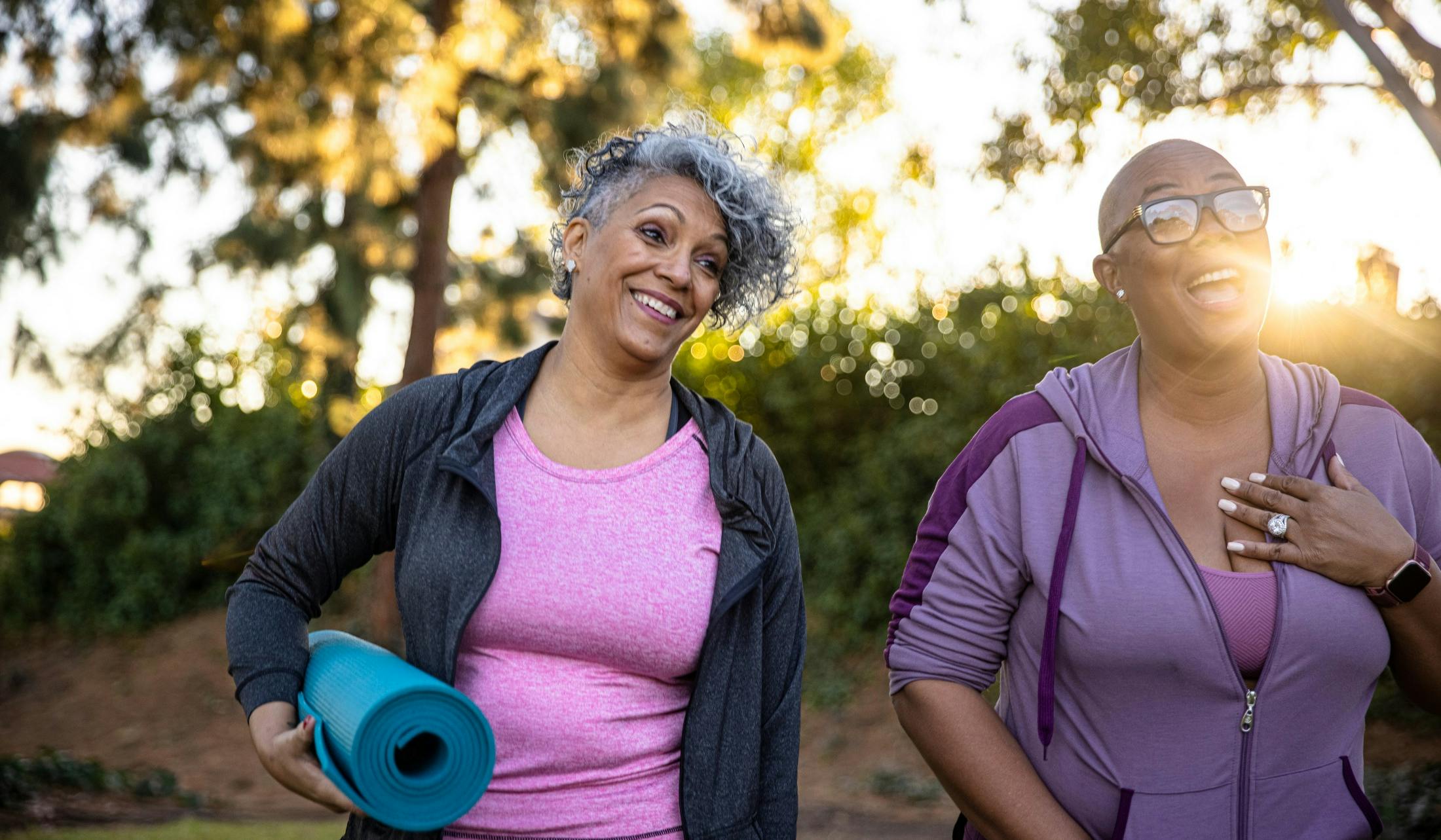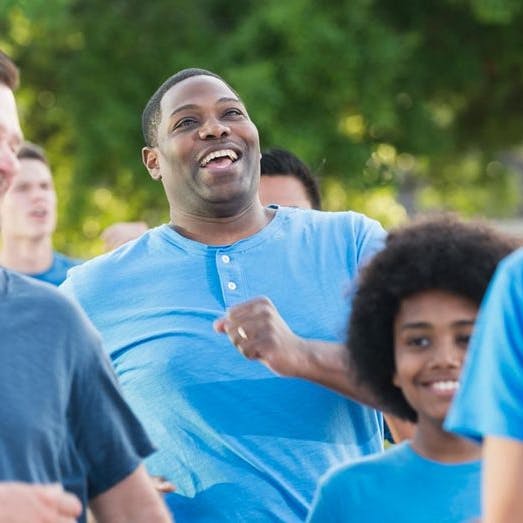Why Sitting All Day Increases Risk of Death
The ‘Active Couch Potato’ Syndrome plaguing most of America can lead to devastating health risks, including long-term weight gain and increased stress on the body.

The human metabolism was designed for the hunter-gatherer lifestyle, allowing the body to capitalize on times of excess and survive times of scarcity. Fat stores were an evolutionary strategy that extended one’s life expectancy. Unfortunately, that same metabolic tendency that kept humans alive thousands of years ago is having devastating consequences in today’s current environment.
The pounds that are packed on thanks to the sedentary lifestyle of most individuals are not shed, as there is never a time of famine. Rather they become increasingly accumulated — putting those who sit all day at increased risk of death.
What is an ‘Active Couch Potato’?

It's a great goal to work out for 30 minutes a day, 5 days a week, as the CDC recommends. However, if the rest of the day is spent sitting, individuals could still face some serious health concerns. The solution? Get up and move. Rather than sit while watching TV, try standing for five minutes or pacing the room. Better yet, turn on some tunes and have dance party.
The World Health Organization recommends moderate-intensity aerobic physical activity, 30 minutes a day, five days a week for adults 18 to 64 years old. But is this enough to really make a difference? Research suggests it may not be.
The study was conducted in Finland. It included more than 3,700 female and male participants. It found that a substantial majority of individuals worked out regularly for 30 minutes but then spent the vast majority of their day sitting. These individuals were classified as ‘active couch potatoes.’ The individuals suffered from elevated:
- Blood Sugar
- Cholesterol
- Body Fat

Thanks to the rise of 'office jobs,' more and more people spend the day sitting while at work and then continue sitting when they get home.
9 Ways Sitting All Day Increases Risk of Death
1. Weight Gain Can Enhance Structural Damage in the Knee
Researchers at the University of California published a study in April of 2022 that evaluated the direct correlation between gaining weight and knee pain. They found that those who had greater than a 5% increase in body weight over 4 years were 34% more likely to develop frequent knee pain.
This is a serious concern because an increase in knee pain commonly results in a decrease in physical activity — a status that has a direct impact on life expectancy. Researchers discovered that inactivity was responsible for 9% of premature mortality.
2. Weight Gain Can Cause High Blood Pressure (Hypertension)
Research shows that the more weight a patient gains, the higher the odds of high blood pressure. In a 2017 study, researchers evaluated more than sixteen thousand patients for the effects of weight gain and hypertension. Among the participants, 13,631 patients completed the one-year study.
The study found that a BMI increase of 1 kg or more was “associated with a significantly higher odd of uncontrolled hypertension. Why is this of concern? Because adoring to the World Health Organization, “worldwide, raised blood pressure is estimated to cause 7.5 million deaths, about 12.8% of the total of all deaths.”
3. Weight Gain Can Increase the Risk of Type 2 Diabetes
Weight gain has long been associated with an increased risk of Type 2 diabetes. Obesity, in particular, puts patients at extreme risk. In a research article published by the Texas Heart Institute Journal, researchers found that women with a body mass index (BMI) of 30 are 28 times more likely to develop diabetes. Furthermore, the risk of diabetes jumps to 93% for those with a BMI of 35 or more.
4. Weight Gain Can Increase Cholesterol

Finding ways to be active and eat healthy can help reduce health risks, improve quality of life, and extend life expectancy.
Cholesterol plays an essential role in critical functions, such as making hormones and building cells. Unfortunately, too much cholesterol can have devastating health impacts.
According to an article published by Johns Hopkins Medicine, “The waxy cholesterol builds up in artery walls and contributes to plaque, a hard deposit that narrows and clogs the arteries.”
The American Heart Association is clear that high cholesterol can affect those of any weight. However, research suggests that those who are overweight are more likely to suffer from high cholesterol. In fact, research shows that when a patient loses 5-10% of their body weight, they are likely to see a significant reduction in cholesterol levels.
5. Weight Gain Can Increase the Chance of Coronary Heart Disease
A meta-analysis published in JAMA Internal Medicine looked at more than 300,000 individuals to evaluate the correlation between being overweight and the increased risk of coronary heart disease (CHD). Researchers found that those who were overweight we 45% more likely to suffer from CHD.
6. Excess Weight Can Increase the Chance of Stroke
A stroke occurs when the blood supply to part of the brain is interrupted or reduced. This prevents the brain from getting oxygen, which can lead to numerous neurological deficits and declines. Research shows that the chance of suffering a stroke is more than doubled in patients who are overweight.
Popular Health Tips
7. Excess Weight Can Increase the Chance of Some Cancers
According to the American Cancer Society, “excess body weight is thought to be responsible for about 11% of cancers in women and about 5% of cancers in men in the United States, as well as about 7% of all cancer deaths.”
In fact, excess weight has been clearly linked to more than 10 different common cancers, including:
- Breast Cancer
- Colon and Rectal Cancer
- Esophagus Cancer
- Stomach Cancer
- Esophagus Cancer
8. Weight Gain Can Lead to Gallbladder Diseases
In a 2015 study published in the Annals of Hepatology, researchers looked at the correlation between a patient’s BMI, waist-to-hip ratio (WHR) and waist-to-height ratio (WHtR) and the likelihood of developing gallbladder diseases.
Researchers found a direct correlation between WHR in men and the prevalence of gallbladder disease. For women, WHR proved to correlate to a prevalence, but the biggest correlation was in WHtR among women.
9. Obesity Can Lead to Kidney Disease
Researchers have shown that obesity is a cause of kidney disease. Scientists at the University of Oxford found that each 5kg increase in BMI caused roughly a 50% increased risk of developing chronic kidney disease.
The study included nearly 300,000 individuals and was published in the January 2021 edition of the Journal of the American Society of Nephrology.
5 Ways to Start Moving & Improve Your Health

Completing a workout that doesn't feel completely miserable substantially increases an individual's chance of working out again.
1. Reward Yourself with Calorie-Free Incentives
We all love to be rewarded, and research proves as much. In a 2021 megastudy published in Nature, researchers found that motivational programs could substantially increase participation. The results show that offering just a 9 cent financial reward for something as simple as showing up to the gym after missing a planned workout increased gym visits by 16%!
But the kicker, when you’re trying to move more and weigh less, is finding rewards that don’t work against you. Often we reward ourselves with a cookie or a bowl of ice cream. It’s not unusual to raise a calorie-heavy libation to celebrate a big win or recognize a milestone.
We’re not against indulging every now and then. (We’re not monsters, after all.) But we also believe in moderation. And when it comes to rewarding yourself, without derailing all your hard work, finding weight loss incentives that don’t include food or drinks, can be extremely helpful.
2. Pick a Workout that Doesn’t Feel Miserable
The phrase “no pain, no gain” was popularized in the 1980s by the American actress Jane Fonda. Fonda is attributed with the aerobics craze of the era thanks to her series of workout videos. The other saying for which she was well-known was “feel the burn.”
And while there’s nothing wrong with a grueling workout (if that’s your thing), research actually shows that the burn may actually be what burns you out. Post-workout endorphins weren’t found to correlate to how likely an individual was to keep working out.
In fact, the biggest correlation was how happy — or better yet, how not unhappy — an individual was during their workout. Those who were completely miserable during the “pain” were less likely to keep being active.
3. Park at the Back of the Parking Lot
Walking is one of the best ways to get your body moving. A low-impact activity, it can be accomplished nearly anywhere — even in a parking lot. Listicles everywhere love to tout this simple tip, and with good reason. It works!
According to Elise Paxson’s article, ‘Parking Further Away to Get More Steps: Does It Help?’ parking at the back of the parking lot easily adds an extra 400 steps per day at a minimum.
4. Help Your Body Heal Naturally
Developed more than 100 years ago, prolotherapy helps the body naturally heal injured ligaments and surrounding tissues. It involves injecting an “irritant” into the soft tissue at the site of the injury. The irritant sends signals to the brain, helping trigger the body’s natural healing process.
In a 2016 clinical study, researchers looked at the effectiveness of prolotherapy. The study had a 91.3% success rate for helping reduce pain and increase stability with as little as one prolotherapy injection.
5. Make Sure You’re Getting Enough Sleep
Sleep and physical activity go hand-in-hand. Johns Hopkins Medicine outlined the best approach to exercise for better sleep. But research shows that sleeping can also promote better exercising.
An article published by the American Journal of Physiology evaluated how sleep impacted the growth hormones — which play a critical role in both metabolic rate and energy levels. They found that the more high-quality sleep an individual got, the higher their growth hormones. In short, if you want to move more, sleep more.

While sitting all day can increase the risk of death, finding ways to add more activity to your lifestyle can help reduce this risk and improve your quality of life.
Natural Medical Support
Our naturopathic medical team takes a whole-person approach to medicine, offering patients the full scope of treatment options. We don’t believe in just looking at the symptoms. Rather, we focus on helping identify the underlying cause and providing tangible solutions.
We offer a wide range of services, including or Medically Supervised Weight Loss Program and Prolotherapy, that provides the support and guidance to help patients achieve their goals.








